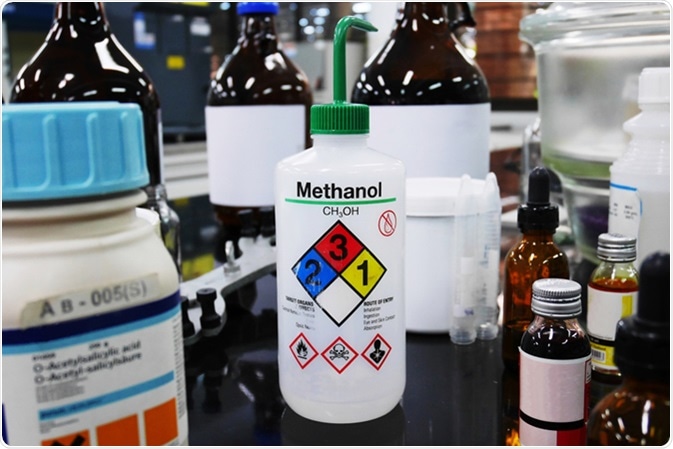What is Methanol Intoxication?
Methanol intoxication is an uncommon but very serious poisoning that mainly results from accumulation of methanol and its metabolites such as formic acid and lactic acid in the body.
This toxic alcohol is used in many industries as a solvent, pesticide, and an alternative fuel source. Major dietary sources of methanol include fresh fruits and vegetables, fruit juice, fermented beverages, aspartame containing soft drinks, among others. Methanol can also be generated endogenously as a byproduct of intermediary metabolism.

Image Credit: mewaji / Shutterstock
Inside the body, methanol is oxidized to formaldehyde (a reaction catalyzed by alcohol dehydrogenase), then to formic acid (a reaction catalyzed by formaldehyde dehydrogenase), and finally to carbon dioxide (a reaction catalyzed by formyl-tetrahydrofolic acid dehydrogenase).
A small portion of ingested methanol is excreted unmetabolised through urine or exhaled air; however, the majority of it is released from the body as carbon dioxide.
Accumulation of formic acid inside the body, the major cause of methanol intoxication, occurs when its production exceeds its rate of clearance. Excretion of formic acid needs a cofactor called folate, and folate deficiency is known to increase the susceptibility of methanol poisoning.
Methanol enters the body by inhalation, ingestion, skin contact, or eye contact. Ingestion primarily occurs through the consumption of methanol-contaminated drinks or food products. Inhalation of methanol vapor or skin contact with methanol may also occur while working in industrial setups. Irrespective of the source, exposure to a high concentration of methanol can lead to serious health complications, such as breathing difficulty or respiratory failure, blurred vision, complete or partial blindness, severe abdominal pain, vomiting, diarrhea, severe head ache, confusion, seizers, dizziness, coma, or even death.
How to Cope with Methanol Intoxication
To date, most of the strategies developed for treating methanol intoxication are based on published clinical reports. A methanol level of ≽ 20 mg/dl is considered as a recommended threshold for treating methanol poisoning. Diagnostic approaches that are most efficient in detecting methanol poisoning include:
History and physical examination
Taking a history of the type and duration of exposure and physical examinations of initial signs and symptoms.
Serum osmolal gap
Higher osmolality indicates alcohol accumulation in blood.
Serum anion gap
Serum anion gaps indicate formic acid or lactic acid accumulation in blood.
Gas or liquid chromatography
Measuring the concentration of methanol in blood.
Liquid-based saliva test
This test detects methanol concentration in saliva.
The primary aim of any methanol intoxication treatment is to prevent methanol metabolism and/or remove methanol and its toxic metabolites from the body. Treatment regimens that are mainly employed to achieve this goal include:
Inhibition of methanol metabolism
This is achieved by oral or intravenous administration of an alcohol dehydrogenase inhibitor. This treatment does not require hospitalization and has minimal side effects. Since ethanol competes with methanol for the binding to alcohol dehydrogenase with much higher affinity, it can also be used to prevent methanol metabolism. However, infusion of ethanol should be continuous and must be performed in an intensive care unit.
Hemodialysis
Hemodialysis is very effective for removing methanol and its toxic metabolites from the body. This technique is particularly effective for patients who are exposed to methanol for a long duration. To increase the rate of conversion of formic acid to less toxic metabolites, intravenous administration of folinic acid is also helpful.
First-Aid for Different Types of Exposure
Measures that must be taken immediately after methanol exposure include:
Eye contact
Washing the eyes with lukewarm water for at least 15 minutes and immediately seeking medical attention.
Skin contact
Remove clothing and wash the affected skin area thoroughly using soap and water; cover all open wounds; cover the patient to prevent shock and loss of body heat; immediately seeking medical attention.
Ingestion
Checking the respiration, heartrate, and blood pressure to ensure proper pulmonary and cardiovascular functioning; do not force the patient to vomit; seeking medical attention immediately.
Inhalation
Checking respiratory and cardiac functions; administering oxygen in case of shortness of breath or breathing difficulties; if breathing stops, giving artificial respiration; immediately seeking medical attention.
Further Reading
Last Updated: Feb 27, 2019